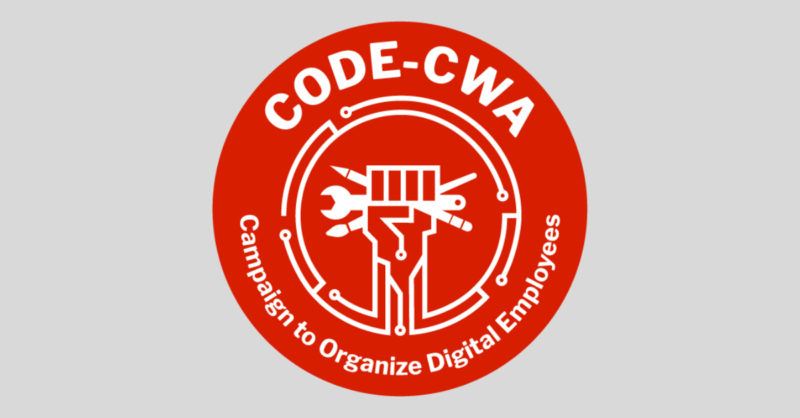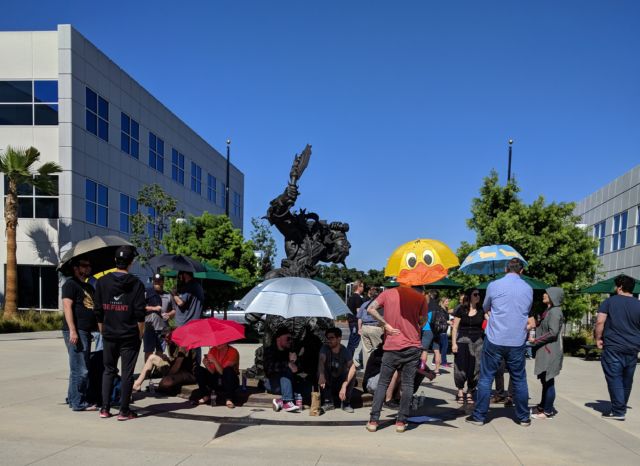
It’s been almost two years now since the launch of Game Workers Unite (GWU), the most concerted effort yet to bring game developers to fight for better working conditions industry-wide. In the years since, we’ve seen a few stuttering steps toward collective action inside game studios, including an employee walkout at Blizzard to protest the company’s controversial policy toward Hong Kong protesters and a walkout at Riot to protest proposed arbitration over sexual harassment allegations (that case was later settled without arbitration).
But while nearly half of developers supported the idea of unionizing in a GDC survey published last year, no major game studios have thus far announced formal plans to form a workers’ union.
The industry’s stalled labor effort got a potential shot in the arm last week, though, when GWU announced it is partnering with the Communication Workers of America (CWA) to form the Campaign to Organize Digital Employees (CODE). The move puts one of the country’s biggest unions—with a reported 700,000 members represented across telecom, IT, news media, education, and more—squarely behind the effort to bring tech and gaming workers together for collective bargaining.
“CWA has decades of deep experience, knowledge, and expertise that are invaluable in helping level up the organizing ability of workers in the game industry,” GWU co-founder and CODE lead organizer Emma Kinema told Ars in a recent interview. “CWA’s history of organizing national campaigns across many locations all over the continent is invaluable, when thinking about the sprawling nature of many of our corporations.”
Improving a “dream job”
Kinema says the CWA reached out to the nascent Game Workers Unite movement soon after it was formed and has spoken with various local chapters of the organizing effort over the last two years. In that time, and through discussions across the industry, Kinema says that developers have generally been “curious or open to the idea of unionization,” in her experience.
“Ultimately, every person comes to work with some grievances and some issues they wish to be fixed or improved,” she told Ars. “As folks get to know that union organizing really means coming together with your coworkers to support one another, care for one another, and improve conditions for one another, folks are usually really responsive to that.”
That said, there are some unique issues in the game industry that may make it harder for workers to organize a union effort. “The vast majority of game workers are in the industry because it’s our dream job, and working on games is our passion,” Kinema points out. “Unfortunately, that passion can open us up to exploitation by our bosses, because we are simply grateful or content to have the job we have.”
Kinema said the union is also pushing back against “the impression that unions are only for blue-collar industrial-style jobs,” and that highly paid tech professionals don’t need such protections. But that impression doesn’t take into account the “outsourcing firms, temporary employment schemes, and low-wage positions of all sorts” that are “as essential to the industry as the more publicly visible developers at name-recognition studios,” Kinema said. “The industry is not a single monolith, and we need to care about and organize all workers throughout the industry.”

Even for developers with steady, salaried positions, “no one comes to work at a perfect place, with no problems, and nothing to be improved or optimized,” Kinema said. “All workers have issues they face and reasons to organize. So even workers with relatively affluent positions still can benefit and effect real positive change in the world through unionization.”
“Dream job” or not, Kinema says developers have expressed concern about issues like regular mass layoffs across the industry and the persistent use of “crunch time” to get games out the door. Wage gaps and discrimination, poor healthcare, job instability, and inclusion and supportive policies for workers also rank high among the issues identified by union-curious developers, Kinema said.
What’s taking so long?
So when will we see the first major game company announce a unionization vote? Kinema didn’t want to speculate on a timeline, which might be wise after a late 2018 Polygon interview where Kinema made the failed prediction that “by the end of 2019, you’re going to see some public campaigns.”
That said, Kinema told Ars that current union campaigns are “coming further along than any previous efforts in the North America region.” Even before the announcement of CODE, she said, the CWA “has been helping organize game workers… at a few companies we don’t discuss [publicly] presently.”
Around the industry, Kinema said there has already been “a fair amount of internal messaging and retaliation” from managers to try to quash any potential unionization efforts. And some studios might be waiting for others to take the first step before moving forward with their own union plans—Kinema admitted there is “nervousness for some to be at the beginning of the game industry labor movement.”
But Kinema also expressed confidence that all of these barriers could be overcome. “Labor organizing simply takes time, whether you are organizing a small coffee shop, a grocery store, or a large multinational tech corporation,” she said. “It’s personal, one on one, conversation-based work, and it takes time, patience, and empathy. And those first public campaigns will come.”
Author’s Note: Some Ars Technica staffers are members of the NewsGuild of New York, which is a subsidiary of the CWA.
https://arstechnica.com/?p=1645309

